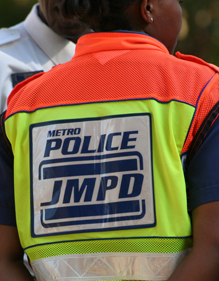|
Getting your Trinity Audio player ready...
|
 Every day, street traders in Johannesburg are expected to pay bribes to the police: if they don’t pay up, their stock is confiscated and they are ticketed. After they pay the fines, the hawkers find that not all of their stock is returned; most of it is still missing.
Every day, street traders in Johannesburg are expected to pay bribes to the police: if they don’t pay up, their stock is confiscated and they are ticketed. After they pay the fines, the hawkers find that not all of their stock is returned; most of it is still missing.
Last week, on Behind the Headlines – which is aired on Soweto TV every Tuesday night – Corruption Watch and the community television station partnered to expose the exploitation of hawkers and street merchants by the Johannesburg Metropolitan Police Department (JMPD).
The 45-minute magazine show, hosted by Buti Rampa, explored the issue through a number of interviews. Among those interviewed were members of the Corruption Watch team. One of the most vociferous voices, though, was that of Edmund Elias, the spokesperson for the South African National Traders’ Retail Alliance. Elias, a street trader in the Johannesburg CBD, described the abuse and exploitation of street hawkers today as reaching a “crisis point”.
“We have given up at the moment with the JMPD. The stock that has been confiscated is unaccounted for. We have taken the decision to go to the public protector,” he said. “We firmly believe that a criminal syndicate operating within the JMPD is operating freely and unchecked.”
In April this year, two street traders were hospitalised after a group of metro police assaulted them. Andries Ndlovu, 37, had rushed to help 60-year-old Joseph Khumalo, who was being beaten by six officers. Khumalo had had his stock confiscated and had asked the police for a ticket. The metro officers, infuriated by the request, attacked the elderly man. Other hawkers in the vicinity said police were asking for a R50 bribe, but it cannot be confirmed if Khumalo was offered this same option.
About 20 seconds of the assault was caught on camera and the film was handed to various media agencies. The officers involved in the attack have subsequently been taken off street duty and are facing assault and bribery charges.
JMPD spokesperson Wayne Minnaar was one of the people interviewed on Behind the Headlines. He stressed that the issue came down to the width of the pavement.
“It’s not our intention to fight with street traders,” Minnaar said, noting that the public welfare of walking on a narrow pavement was one of the main reasons for the ticketing. In response, Rampa asked if these rules were not outdated in a country with unemployment at more than 25 percent.
Minnaar replied: “We realise that there are many people who depend on the selling of goods on the street to make a living. But if it’s done in a manner that it’s going to impede traffic flow, it’s going to create a problem. It’s going to cause congestion and affect other businesses.”
He did not speak about bribery or assaults, but did say that trading in unmarked areas was illegal.
Corruption Watch journalist Zaheer Cassim also spoke to Rampa about why the non-profit group had taken up this issue. He said the April attack on the Ivory Park traders had caught the attention of the organisation because of the involvement of metro police officers, just weeks after Corruption Watch had highlighted the corruption on the roads by the same police force.
Rampa echoed some of Minnaar’s concerns that selling on the side of the road was illegal.
“If it is illegal, it is illegal,” agreed Cassim. “[But] What I’d like to ask the JMPD is that it’s illegal to take bribes, but police officers take bribes all the time. What are they doing about that? It’s easy to pick on the poor guys … I’d like to see the JMPD take more action within their own organisation and try to bring in a stricter value and integrity system.”
View the exposé here:





